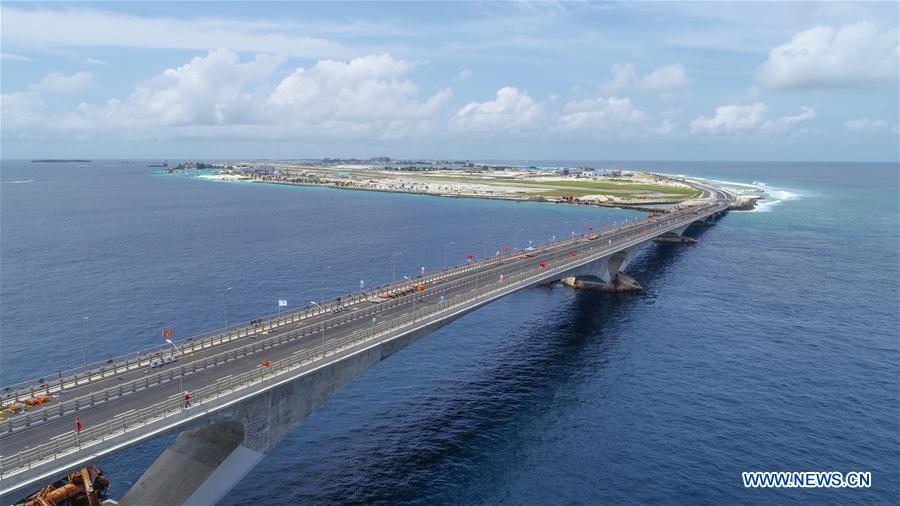China-Maldives Friendship Bridge delivering benefits to Maldivian people
The China-Maldives Friendship Bridge connecting Maldives' capital Male with neighboring Hulhumale, which opened to traffic in August, has brought tangible benefits and improved lives of local people.
The China-Maldives Friendship Bridge connecting Maldives' capital Male with neighboring Hulhumale, which opened to traffic in August, has brought tangible benefits and improved lives of local people.

Photo taken on Aug. 30, 2018 shows the aerial view of the China-Maldives Friendship Bridge, in Maldives. [Photo/Xinhua]
Going to school on time
The bridge officially opened last month, with nine new buses lined up to provide services on the bridge. Today, the bus service operates 52 times a day, every 20 minutes.
"On the opening day, we stopped a number of young people who didn't pay attention to the traffic light and zipped across the bridge in sheer excitement. But now, more than a month has passed, and everyone is abiding by the traffic rules," traffic policeman Ashan told Xinhua.
Nahidha, a resident of Male, was delighted to be on the bus with her three-year-old son.
"I can now take my son to the park on the Hulhumale island at any time. Before the bridge was opened, that was not so easy," she said.
The bridge has brought much relief to the people living on the Male and Hulhumale islands, including school girl Aisha (alias).
"The boat ride between the two islands was affected by many factors such as the weather. I used to have difficulties in getting to school in Male on time. I would be very anxious about reaching on time because of the unpredictability of the weather," Aisha said.
However, today Aisha rides her father's motorcycle every morning and arrives at her school in 10 minutes.
"Reaching in 10 minutes was impossible before the bridge was opened to traffic," she said.
Bringing more business
Hulhumale is known locally as the "Youth City," which is at least three times larger than Male, and has restaurants, larger parks, a stadium and beachfront. The opening of the bridge has made this island easily accessible to residents in Male.
Rehendhi Rabindan, a foreman in a restaurant in Hulhumale, said that the bridge has made the restaurant more prosperous.
"Since the bridge was opened to traffic last month, the number of guests visiting the restaurant has increased significantly. On weekends, many people living in Male come here for dinner. The staff are constantly busy," he said.
"What's more, many guests who live in Male could order takeaways and pick up the food within 10 minutes," Rabindan added.
Bridge on the wall
The people in Male also have expressed their appreciation of the bridge through a painting.
On the wall of the Rehendhi Maizaan park in Male, there are huge paintings of the China-Maldives Friendship Bridge.
The artist, Ali Amir, told Xinhua that in 2016, he got an assignment from the government to paint the China-Maldives Friendship Bridge on the walls of the park that was about to open. And he was requested to complete the work within a week.
"I have seen the original design of the bridge and felt it was really beautiful. But it was a challenge to depict the bridge and the surrounding environment on the wall of nearly 50 meters and in such a short time." Amir said.
Standing in front of the finished painting, he said, "Apart from the difficulties of drawing on a wall, it rained a lot when I was trying to finish the painting. However, my assistant and I carefully studied the structure of the bridge, built a shed here, and worked day and night."
The construction of the China-Maldives Friendship Bridge started at the end of 2015. When Amir began painting, the bridge was still under construction. Since then, Amir's painting on the wall has attracted a lot of people who come to the park and are curious about the bridge.
Amir has a new plan. If time permits, he will draw the bridge more delicately. And he will also motivate his students to paint the bridge from their own points of view.
"What's more, I am very eager to build a bridge museum to let more people know about the bridge," Amir said passionately.
The bridge is an iconic project of the Maldives and China in co-building the 21st Century Maritime Silk Road, as well as the largest infrastructure project in the Maldives to date.

